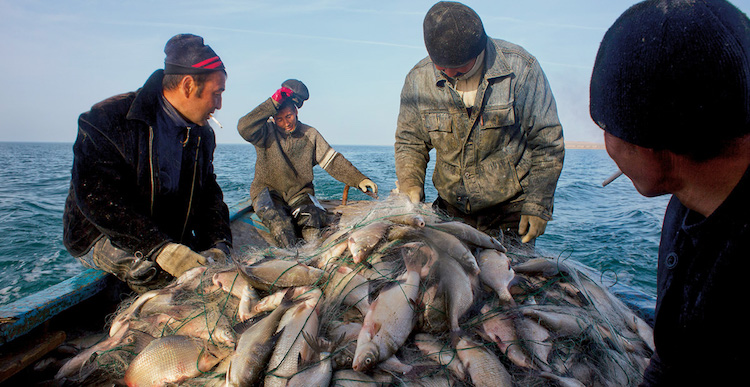
By Radwan Jakeem
NEW YORK (IDN) – The zone of destruction created as a consequence of what has been called “one of the planet’s worst environmental disasters” has long crossed the frontiers of Central Asia, demanding urgent measures from the international community.
Every year more than 150 million tons of toxic dust from the bottom of the dried up Aral Sea are carried long distances by the wind to the people in Asia, Europe and even the thinly populated Arctic. (P17) ARABIC | HINDI | JAPANESE TEXT VERSION PDF
Before it started shrinking, the Aral Sea was the fourth largest lake in the world – after the Caspian Sea, the Great Lakes in North America and Lake Chad – an oasis in the Central Asian desert that fed all the adjacent cities. It offered prosperous fishing and a resort destination.
But from the 1960s onward, the lake-sea began to dry up rapidly in part because the two major rivers feeding the sea, the Amu Darya and Syr Darya, were diverted for Soviet projects to irrigate cotton and rice fields. The oasis turned into a cracked white desert with islands of rusted ships.
Since then, the era of projects to save the Aral Sea has begun. The northern part was saved by Kazakhstan. Initially, work began on the construction of the dam Kokaral to stop the ingress of water into the sand.
When the dried pool began to fill with water, biologists started restoration of flora and fauna. Those efforts were not in vain: now the water level in the Small Aral has reached 50 meters, the concentration of salt in a liter has decreased so much that the pond has again become suitable for fish, whose number of species meanwhile exceeds two dozen.
Thanks to the measures taken in the territory of Kazakhstan, the so-called Small Aral has been restored, but this is only 1/20 of the water area and 1/40 of the water mass of the former sea. The rest of the former Aral is now a lifeless desert.
Kazakhstan not only outlined the plan of action. It also succeeded in acquiring two World Bank loans for the project “Regulation of the Syr Darya river bed and preservation of the northern part of the Aral Sea”. The total cost of the two phases is more than $200 million.
An example of the revival of the Small Aral gives hope to scientists that it is also possible to revive the Aral Sea. But this requires adequate financial support, political will and competent scientific approach.
First, it is necessary to improve long-standing irrigation canals in Uzbekistan and Turkmenistan. Secondly, to refuse to maintain small reservoirs in the delta of the Amu Darya, which evaporate in the summer anyway. These flows can be directed to the filling of the western part of the Great Aral, where there is still water. Thirdly, it is necessary to abandon the cultivation of moisture-loving crops, which, despite the ecological disaster, continue to grow on an industrial scale in Uzbekistan and Turkmenistan.
Everyone recognizes that the drying sea is a widespread catastrophe, the consequences of which, if not dealt with, will continue to be felt throughout the world for a long time. The number of people affected by the drying out of the Aral Sea already exceeds 5 million. These are people who have been diagnosed with respiratory diseases, esophageal diseases, laryngeal cancer and even blindness in the face of environmental catastrophe.
Against this backdrop, the heads of the founder states of the International Fund for Saving the Aral Sea – Kazakhstan, Kyrgyz Republic, Tajikistan, Turkmenistan, and Uzbekistan – met in Turkmenistan on August 24, 2018. The meeting was special. At least because the last time the delegates of this forum met was nine years ago. There were quite a few pressing reasons for serious negotiations. However, disagreements always gained the upper hand.
Now there is a discernible trend towards rapprochement among the region’s players. Central Asian states have exhibited their intention to agree even on the most problematic items on the general agenda. It remains to be hoped that the Aral Sea will be no exception.
Estimates of projects to save the Greater Aral Sea will be many times higher. But judging by the concerns of the international community and the frightening estimates of international researchers about the consequences of the complete drying out of the sea, there should be no problem in galvanizing adequate financial support. There is every reason to muster political will among all countries, connected by a single water system with a drying pond and rivers feeding it.
Therefore, if Uzbekistan declares its readiness to save the sea, the authorities of the country should realize that this would necessitate sacrificing projects for the exploration and production of oil and gas at the bottom of a dried basin. We will need to choose between ecology, public health on the one hand and phantom revenues from hydrocarbon production on the other.
With this in view, organizers of the summit held in Turkmenistan hope to draw the attention of leading financial institutions, international organizations, foreign corporations, and the business community on the whole for the benefit of the environment.
It is to be hoped that the recent historic meeting of the heads of the founding states of the International Fund for Saving the Aral Sea, which took place after almost a decade, will open a new chapter in its activities, giving a powerful impetus to regional partnership in Central Asia. [IDN-InDepthNews – 14 November 2018]
Photo: Working from dusk until dawn, fishermen from around the town of Aral in Kazakhstan haul in a catch from the North Aral Sea, where the water level has risen and salinity has decreased – in stark contrast to the larger South Aral Sea, which has gone nearly dry. Credit: Aramco World
IDN is flagship agency of the International Press Syndicate.
facebook.com/IDN.GoingDeeper – twitter.com/InDepthNews











